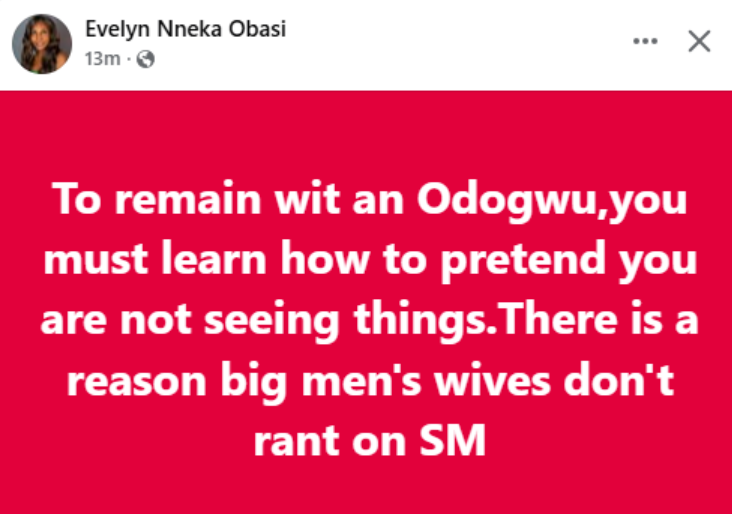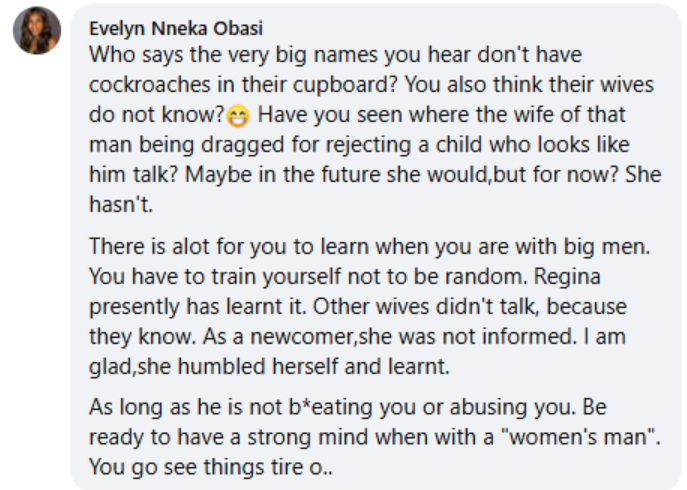In today’s ever-connected world, social media has become a go-to platform for sharing personal stories, victories, and even struggles. Curiously, however, the wives of Nigeria’s wealthy and high-profile men rarely join public conversations when it comes to their private marital issues. This cultural phenomenon has sparked debate, with recent commentary from Nigerian woman Evelyn Nneka Obasi bringing fresh attention to the reasons behind this silence.
Keeping Up Appearances: The Silent Strategy of Influential Wives
According to Evelyn Nneka Obasi, the absence of public complaint by women married to powerful men is not necessarily a sign that their marriages are without faults. She shares that many of these women have learned, sometimes painfully, to overlook their husbands’ indiscretions and flaws—including infidelity—in order to preserve their families and social standing.
“It isn’t because their lives are perfect,” she explained. “These women have simply become experts at ignoring what they can’t change, and keeping their marital issues behind closed doors.”
Why Is Silence the Norm?
Obasi, speaking from personal experience and observation, suggests that silence is a survival tactic in such marriages, where public opinion can be especially harsh. In a society where the reputation of a powerful family often depends on the discretion of its members, wives of influential men face unique pressures to maintain a certain image—no matter what happens behind the scenes.
Social Pressure and Self-Discipline
Obasi put it pointedly: “To remain with an Odogwu (a distinguished or powerful man), you must master the art of looking away. It is not by accident that you don’t see the wives of the rich and famous ranting on social media.” Her Facebook post, made on Wednesday, quickly garnered attention from Nigerian women and men, who weighed in on whether silence is truly golden, or simply a sign of endurance.
“Who says the very big names you hear don’t have cockroaches in their cupboards? Do you imagine their wives are blind to it? Take the case of a man who rejected a child that looks exactly like him—did you ever see his wife speak out? Maybe she will in future, but so far, silence. There is much to learn when you’re married to a powerful man. You can’t afford to be careless. Regina (presumably referring to a Nigerian celebrity) has had to learn this. The more experienced wives never spoke because they knew. As a newcomer, she didn’t, but I’m glad she learned to humble herself. As long as there is no physical harm or abuse, you must build mental resilience. Being with a ‘ladies’ man’ means you’ll see plenty—be prepared.”
Beyond Appearances: The Price of Silence
The culture of silence among wives of prominent Nigerians is complicated. On one hand, it can be a form of protection in a country where high-profile scandals can destroy careers and families overnight. On the other, critics argue that this silence can perpetuate unhealthy power dynamics and further stigmatize those who do come forward with their struggles.
- Reputation Management: Many believe the stakes are simply too high. Speaking out could lead to public disgrace, loss of social status, or harm to family business interests.
- Fear of Backlash: For women, breaking silence can mean facing online trolling, shaming, or even threats from both within and outside the family.
- Cultural Expectations: Nigerian and West African societies value discretion and ‘family dignity,’ sometimes at the cost of personal well-being.
Local Voices and Cultural Analysis
Obasi’s reflections have resonated with many Nigerians who have witnessed similar patterns in their communities. Lagos-based social commentator Adeola Amadi notes, “There’s a deep, often unspoken, agreement that family matters remain private—especially for the privileged. A wife who chooses transparency risks not only her comfort, but often her children’s standing in society.”
Ghanaian analyst Kwame Tutu draws parallels with similar dynamics in Ghanaian elite circles: “It’s not just about the wealth, but the expectations. Society looks to influential families for strength, and any crack threatens the image of stability. The silence is as much about community judgment as it is about individual choice.”
Is Enduring in Silence Always Best?
While some support the notion that stoicism protects families, others argue that silence only serves to reinforce problematic behaviors and discourage progress.
- Some mental health advocates urge women not to bear heavy burdens alone, noting that unaddressed issues can lead to depression or anxiety.
- Legal professionals point out that silence may prevent women from accessing their rights or finding support in abusive situations.
Impact on Younger Generations
The practice of maintaining silence is being challenged by a new generation of Nigerians and West Africans, especially those exposed to global conversations about gender equality and mental health.
However, Obasi’s commentary also laments that “newcomers” in such marriages often struggle before adapting, drawing lessons from more experienced wives who have learned to “humble themselves and learn.” As social norms continue to evolve, the tension between tradition and change remains strong.


The Global Perspective: Changing Attitudes?
Across Africa and elsewhere, social media is slowly eroding the walls of silence around marital challenges. Notably, some women are finding cautious ways to address issues publicly, seeking solidarity and advice, even if anonymously. Online communities—from X (Twitter) spaces to Facebook groups—have sprung up to offer support, proving that silence is no longer the only option.
Nonetheless, in the upper echelons of society, the old rules persist. Many wives continue to see discretion as an act of courage, not weakness, while critics insist that change is long overdue.
What’s Your View?
Should prominent families continue to guard their secrets, or is it time for a more open conversation about relationships, power, and honesty? Share your perspective: Is silence truly golden, or do you think greater transparency can pave the way for healthier marriages in Nigeria and across Africa?
Drop your comments below—your voice matters! Stay tuned for more stories exploring the complexities behind Nigeria’s high-profile relationships.









